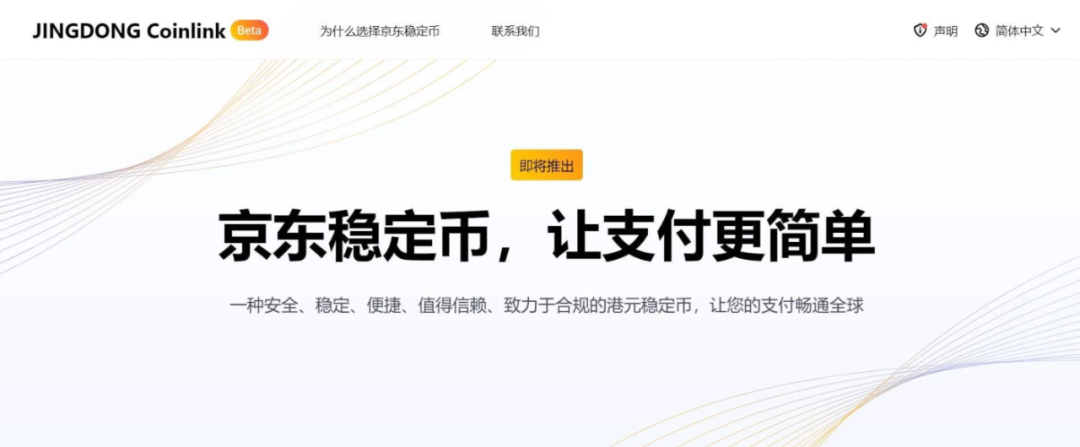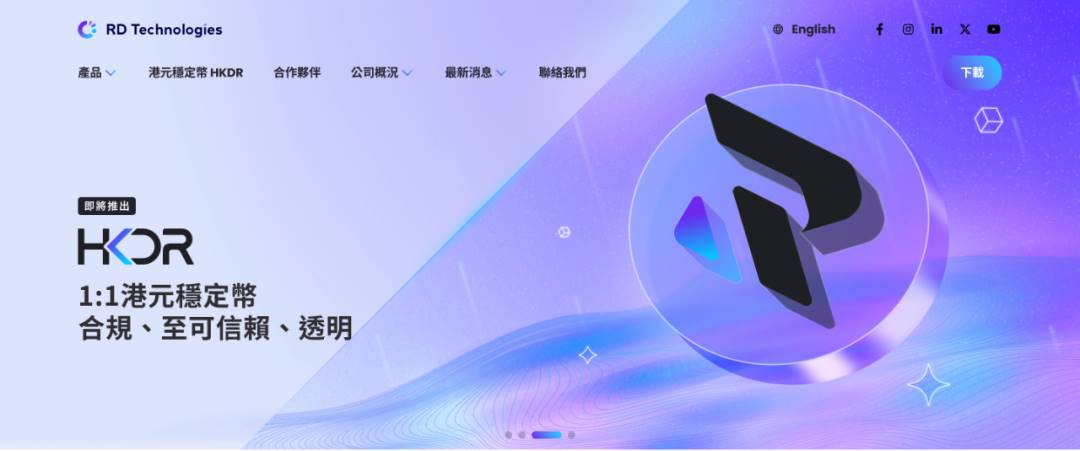The Financial Services and the Treasury Bureau and the Hong Kong Monetary Authority are actively promoting the drafting of legislation, and it is expected that the draft regulations will be submitted to the Legislative Council for deliberation by the end of the year.
By Bowen, White Dew Club
On July 18, 2024, the Hong Kong Monetary Authority (referred to as the HKMA) released the list of stablecoin sandbox participants. JD.com, Circle Coin, and Standard Chartered have become official participants, and these three institutions will cooperate with regulators in testing their operational plans and engaging in two-way communication on proposed regulatory requirements to develop a regulatory system that is purposeful and risk-based. At the same time, it was pointed out that in the initial stage, the "sandbox" trial will not involve the use of public funds, nor will it raise funds from the public or provide any related products in the name of the "sandbox."
The Financial Services and the Treasury Bureau and the HKMA stated that on July 17, the two parties issued a consultation summary on the legislative proposal for implementing a regulatory regime for stablecoin issuers in Hong Kong. They are currently making every effort to draft the legislation and are expected to submit the relevant draft regulations to the Legislative Council for deliberation by the end of the year.
Requirements for Entry into the "Sandbox"
The HKMA stated that the purpose of establishing the "sandbox" is to test the business processes of stablecoin issuers and evaluate how they can conduct stablecoin business in Hong Kong in a compliant and sustainable manner. Therefore, applicants entering the "sandbox" need to demonstrate detailed and feasible business and sandbox plans.
One of the key requirements is for applicants to present specific use cases and explain how their stablecoin business can effectively address pain points in economic activities, bringing benefits and new opportunities to Hong Kong's economy and financial activities. At the same time, applicants need to explain how their business network, supply chain, or main partners can drive the long-term demand for the stablecoin to achieve sustainable business development goals. In addition, applicants need to specify how they will demonstrate robust and compliant stablecoin issuance, distribution, and redemption processes through the "sandbox," and explain how their operations comply with regulatory requirements, including stablecoin reserve management and custody, as well as risk control measures for credit, liquidity, technology, business operations, and anti-money laundering.
Considering the practical needs for the effective operation of the "sandbox," there are considerable requirements for entry, and only applicants who fully meet the above conditions can enter the "sandbox." Until the legislation is completed and the new regulations come into effect, the HKMA will continue to handle inquiries and applications for the "sandbox."
Whether individual institutions, including existing stablecoin issuers, apply to enter the "sandbox" depends on various factors, such as the business plans of the issuer after the legislation is implemented and whether there is a need to test the stablecoin issuance process at the current stage and within a limited scope. It should be emphasized that entering the "sandbox" is not a prerequisite for future applications for a stablecoin issuer license. Even if participating institutions in the "sandbox" intend to obtain a license in the future, they must submit a formal application separately after the regulatory system is implemented.
Use Cases for Stablecoins
The HKMA pointed out that the focus of developing digital finance is to introduce emerging technological means to solve and overcome the pain points and difficulties of traditional financial operations, better serve enterprises and individuals in economic activities, improve efficiency, reduce costs, and enhance the experience.
The main use cases proposed by the first batch of "sandbox" participants include payment, supply chain management, and capital market use cases. Currently, fund transfers in these scenarios may involve financial institutions, payment service companies, and settlement systems in different time zones. These "intermediaries" or financial infrastructure do not operate 24/7, and the costs are high and the efficiency is low.
Stablecoins can not only serve as a medium of exchange, reducing costs and shortening transaction times, but can also use their programmable features to develop a variety of innovative solutions, automate and intelligentize financial service processes, facilitate fund flows, and more accurately manage various risks related to transactions. In addition to the above use cases, "sandbox" participants have also proposed other use cases, including Web3, gaming, and virtual asset trading.
Risk Management and Compliance Measures
All operations and testing in the "sandbox" will be conducted within a restricted and risk-controlled environment. Participating institutions will test the stablecoin issuance process in different use cases, while paying special attention to operational and technological risks.
During the process, the regulatory authority will observe how participating institutions comply with the proposed regulatory requirements, such as ensuring that reserve assets are of high quality and highly liquid, whether stablecoin redemption is smooth and can be completed within a reasonable time, whether wallet and private key management is robust, and whether measures to protect stablecoin holders and prevent money laundering are implemented. In addition to meeting the requirements of the "sandbox" and Hong Kong's laws, if the use cases involve cross-border payments, participating institutions must also ensure that both the institution itself and its overseas partners strictly comply with applicable local laws and regulations during the testing process. Depending on the participants' proposals, the progress of testing, and the degree of risk control, the HKMA may adjust the design scenarios and application scope of the "sandbox" appropriately.
It is reported that since the announcement of the launch of the stablecoin issuer "sandbox" in March, the HKMA has received inquiries from dozens of institutions. Which of the proposals from JD.com, Circle Coin, and Standard Chartered is most likely to "come out"? Will there be more institutions participating? There are still many uncertainties.
JD Coinchain Technology
JD Coinchain Technology Co., Ltd. was officially registered in March 2024, with its main business including digital currency payment systems and blockchain infrastructure construction.

According to LinkedIn, the company's CEO, Liu Peng, currently serves as the Vice President of JD Technology and has long been engaged in the field of financial technology, having worked for companies such as Tencent, Huawei, Ant Financial, and JD. Currently, JD Coinchain Technology has obtained licenses from the Securities and Futures Commission (SFC) in Hong Kong for Type 1 (dealing in securities), Type 4 (advising on securities), and Type 9 (asset management).
Circle Coin Technology
Circle Coin Innovation Technology has a background in DeFi, digital payments, and financial technology. The company develops and operates various DeFi applications, providing users with services including decentralized trading, lending, and yield farming. Circle Coin Technology currently has two main businesses: the "Circle Coin Wallet" that supports digital fiat currency payments and the "HKD Stablecoin."

The team has traditional financial experience and a mainland background. It was founded and chaired by Chen Delin, former President of the Hong Kong Monetary Authority, and has six other directors, including Ou Yaping, Chairman of Zhongan Online, Xu Wei, President of Zhongan International, Xiao Feng, Chairman of HashKey Group, Feng Bo, Managing Partner of Dragonfly Capital, Zheng Tuo, Non-executive Director of Boqi Environmental Protection, and Yu Fanyun.
Regarding the selection for the stablecoin "sandbox," Rita Liu, CEO of Circle Coin Technology, stated: "The process of the HKD stablecoin landing requires mutual understanding between regulation and the market. We need to communicate more with the regulators. Moreover, blockchain itself has many advantages, such as its transparency and traceability, which are advantageous in combating crime and anti-money laundering, which is also an area favored by regulators."
"Some stablecoin issuers in the industry have a consensus that within five years, the market is likely to reach three trillion US dollars. Stablecoins can bring more volume from traditional financial markets into Web3. If Circle Coin Technology can bridge Web2 and Web3 well, it will expand into a huge market."
Standard Chartered Bank
Standard Chartered Bank (Hong Kong) Limited, Animoca Brands Limited, and HKT have jointly laid out their plans in the virtual asset and stablecoin field.
Standard Chartered Bank (Hong Kong) Limited is setting up Bitcoin and Ethereum trading counters, making it one of the first global banks to enter spot cryptocurrency trading. In addition, Standard Chartered Bank has launched cryptocurrency custody services in Hong Kong through its subsidiary Zodia Custody, mainly targeting institutional investors. In terms of blockchain applications, Standard Chartered Bank (Hong Kong) has successfully completed the first pilot transaction on a cross-blockchain platform, which connected Hong Kong's eTradeConnect and the People's Bank of China's Trade Finance Platform (PBCTFP).
Animoca Brands Limited is headquartered in Hong Kong and focuses on blockchain games and digital entertainment. The company's quarterly booked revenue reached $90 million, a 72% increase compared to $52 million in the same period in 2023. Of this, $65 million came from digital asset advisory services, including token consulting, trading, and blockchain node operation.
Hong Kong Telecommunications Limited (HKT) is one of Hong Kong's largest integrated telecommunications service providers, established in 1925.
Regarding this collaboration, Animoca Brands stated: "Hong Kong Telecommunications (HKT) will be committed to exploring how stablecoin innovation through the sandbox can support local and cross-border payments, bringing greater benefits to consumers and merchants; Standard Chartered Bank (Hong Kong) will actively participate in the stablecoin issuer sandbox to discuss how to most effectively support the vibrant development of Hong Kong's digital asset ecosystem and gain a deep understanding of the evolution of the stablecoin market, the opportunities, and risks it brings to this ecosystem; and Animoca Brands is committed to promoting the widespread application of digital assets and applying blockchain-related technological solutions to physical assets and traditional economies."
Unlike central bank digital currencies such as Digital Hong Kong Dollar, stablecoins are aimed at financial institutions in various countries and are an important tool for private financial activities. Hong Kong, with a focus on stablecoin issuance, is gradually establishing a comprehensive regulatory framework, which will be a crucial step in the development of Hong Kong's financial infrastructure centered around virtual assets. However, on the other hand, Hong Kong's existing regulatory framework is extremely strict and costly, posing a significant challenge for institutions. Whether the stablecoin "sandbox" can ensure the implementation of stablecoin solutions while maximizing "institution-friendliness" to drive market advancement is another key point to be concerned about.
免责声明:本文章仅代表作者个人观点,不代表本平台的立场和观点。本文章仅供信息分享,不构成对任何人的任何投资建议。用户与作者之间的任何争议,与本平台无关。如网页中刊载的文章或图片涉及侵权,请提供相关的权利证明和身份证明发送邮件到support@aicoin.com,本平台相关工作人员将会进行核查。




